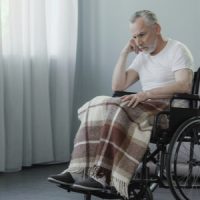Signs of Nursing Home Abuse

Nursing homes have the moral and legal responsibility to ensure the care of our elderly loved ones. Over two million seniors live in nursing homes in America, and the number continues to rise. Unfortunately, the reports of neglect and abuse also continue to rise. Making the decision to move your elderly loved one into a nursing home is a difficult decision. Whether you are the beginning of the process of placing your senior family member into a nursing home, or already have a loved one there, it is important to understand and recognize the signs of nursing home abuse and neglect.
Nursing Home Residents’ Rights
The residents of a nursing home or nursing home facility have the right to the following under federal law:
- Respect and dignity
- The ability to freely communicate with their loved ones
- The right to privacy
- Access to mental, physical and social services
- Freedom from neglect or abuse
- The right to make decisions independently as appropriate
- The ability to file a complaint without the fear of retaliation
- The right to participate in their own personal medical care decisions and plan
- The ability to communicate and participate in activities with their family and friends both outside and inside the nursing home
Signs of Nursing Home Abuse and Neglect
Always watch for any type of change, either physical, emotional or behavioral in your elderly loved one. These signs are generalized, however, if you notice any of them, it may alert you to mistreatment, neglect or abuse occurring in a nursing home. Always notify the nursing home staff, law enforcement, and an attorney if you are suspicious of nursing home abuse or neglect.
- Physical Signs Some common physical signs of nursing home abuse are weight loss, bruises, unexplained infections, bedsores, broken bones, dehydration, difficulty sleeping, unwashed body or hair, malnutrition, unwashed clothes, injuries from falls, any genital injuries, torn clothing, or the contraction of a sexually transmitted disease.
- Emotional Signs When our elderly loved ones get older, they often exhibit symptoms of dementia and Alzheimer’s disease, which can make it challenging to determine if their behaviors are a result of abuse and neglect, or their medication condition. However, if your elderly loved one exhibits strange symptoms completely out of their character such as acting violently, fearful, depressed or anxious, visiting with a medical professional can help determine if this is a sign of dementia or a response to possible nursing home abuse or neglect.
Contact an Experienced Attorney
Nursing home abuse and neglect can take emotional and physical forms, but your elderly loved one may also be taken advantage of financially by unscrupulous nursing home workers. Every senior deserves the right to live in safe conditions free from physical, emotional, or financial abuse. If you believe that your elderly loved one has suffered from any kind of abuse while in a nursing home, contact an experienced and compassionate Columbia personal injury attorney at The Stanley Law Group at 803-799-4700. We can help with the complex legal matters involved in a nursing home abuse case.
https://www.thestanleylawgroup.com/social-media-and-your-personal-injury-claim/
